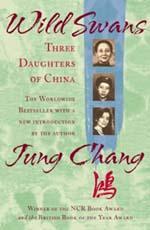By Beth Green
One of the biggest thrills for me when researching a place to visit—whether for tourism or for living abroad—is reading about its history. I have written here before about reading a book just because I like the setting. But I also seek out works of both fiction and nonfiction to flesh out my concept of what a place was like at particular moments in time.
Following is a short list of a few historical books about China I often recommend to friends and other travelers.
* Wild Swans: Three Daughters of China, by Jung Chang, is one of those sweeping, epic tales that
 makes you
want to flip right back to the start after finishing the last page. Part
memoir, part novelized biography of the author’s mother and grandmother, Wild Swans tells the story of a family
as well as a nation. From her grandmother’s bound feet to her mother’s work
with the Communist Party, and finally to Chang’s emigration, Wild Swans illustrates the great changes
China has undergone better than any other book I’ve read on the subject. At the
time I read it, the book was banned in China. I got it from an expat friend,
who got it from a friend, who brought it in from Hong Kong. And yes, I passed
it on.
makes you
want to flip right back to the start after finishing the last page. Part
memoir, part novelized biography of the author’s mother and grandmother, Wild Swans tells the story of a family
as well as a nation. From her grandmother’s bound feet to her mother’s work
with the Communist Party, and finally to Chang’s emigration, Wild Swans illustrates the great changes
China has undergone better than any other book I’ve read on the subject. At the
time I read it, the book was banned in China. I got it from an expat friend,
who got it from a friend, who brought it in from Hong Kong. And yes, I passed
it on. *Journey to the West, attributed to Wu Cheng’En. Often called just Monkey when in translation in the West, this is one of the four great classical novels of China. It describes the pilgrimage of a monk from China to India, on a quest to bring Buddhist scrolls back to his homeland. There is evidence the monk, Xuan Zang, was a real historical figure, but I’m guessing that the tale’s other characters are not: Sun Wu Kong, a monkey king; Zhu Bai Jie, an awakened pig; and Sha Wu Jing, an immortal general fallen from service in the heavenly court. If you travel in Xi’an or the western parts of China you’ll often find references to this party’s legendary journey.
*River Town and Oracle Bones, by Peter Hessler. These two books about journalist Hessler’s experiences, travels, and friendships in China since the 1990s are titles I often recommend to people who ask me for something to read about China’s contemporary history. (I mentioned River Town in my post about the Yangtze River, here.) Hessler moved to a small town in Sichuan province in the 1990s as a Peace Corps volunteer. His books reflect the amazing cultural and social changes that have taken place since that time, and also the changes in his own perceptions of China. He’s got a third book now, Country Driving, which I keep meaning to read.
*1491: The Year China Discovered the World, by Gavin Menzies. Probably known to my friends and family as the book I love to hate, I often recommend people read this book even though I doubt it’s historically accurate. (I’m not the only one. There was considerable controversy about this book’s claims.) Basically, the author asserts that China discovered the Americas and Antarctica before Columbus. I’m willing to accept that as a possibility, but then Menzies goes on to say that the Chinese influence from landings and shipwrecks on their voyages forms the basis for much of indigenous tradition in the Americas.
That’s where I get skeptical. However, what is fascinating to me about this book is the reception it got within China—my students loved it. The government loved it. It was featured on the news. It was widely available for sale (unlike Wild Swans, as I mentioned above, which features actual history.) So I recommend this book, because it has resonated with a huge population—it shows what they would like their history to reveal. Menzies followed up this book with two books I’ve yet to read: 1434: The Year a Magnificent Chinese Fleet Sailed to Italy and Ignited the Renaissance and The Lost Empire of Atlantis.
Do you have some favorite titles about the history of a place? Add them in the comments!

